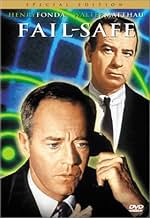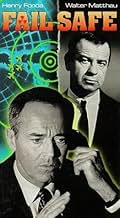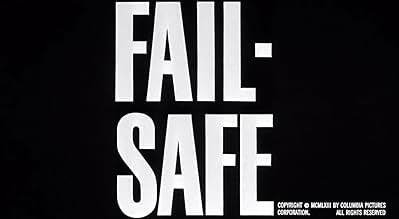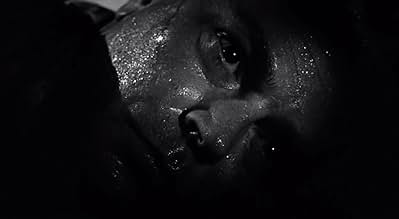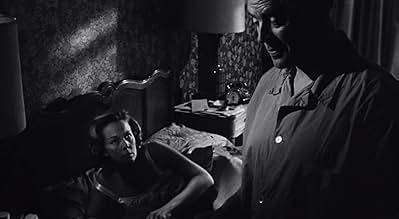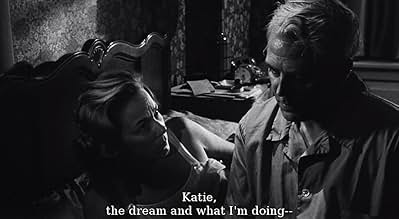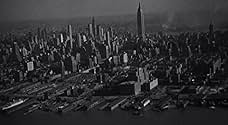NOTE IMDb
8,0/10
26 k
MA NOTE
Une défaillance technique envoie des avions américains à Moscou pour lancer une attaque nucléaire. Une guerre totale peut-elle être évitée?Une défaillance technique envoie des avions américains à Moscou pour lancer une attaque nucléaire. Une guerre totale peut-elle être évitée?Une défaillance technique envoie des avions américains à Moscou pour lancer une attaque nucléaire. Une guerre totale peut-elle être évitée?
- Réalisation
- Scénario
- Casting principal
- Nomination aux 1 BAFTA Award
- 3 nominations au total
Dom DeLuise
- Sgt. Collins
- (as Dom DeLouise)
Avis à la une
This movie was great. It may seem boring to many younger teenage crowds, but you need to take into consideration the era in which this was made. The SFX were terrific for 1964. It was heart pounding and very scary at times. The acting skills of the entire cast are superb. I highly recommend this movie to anyone who wants to know more about the cold war. 4.5 of 5 stars!
The ultimate moral dilemma confronts the President of the United States when everything goes wrong with the strategic offensive power of a US Air Force bomber squadron, leaving viewers shaken at the end of a superior Cold war drama highlighted by its extraordinary claustrophobia.
Filming of Fail-Safe coincided with filming of Dr. Strangelove, and Stanley Kubrick succeeded in getting his film done first. The earlier publicity for Strangelove hurt Fail-Safe's exposure, and this is doubly disappointing because Fail-Safe is in most ways a superior film, telling its story straight and highlighting superior performances by the entirety of the cast, from Henry Fonda, Frank Overton, Fritz Weaver, and Dan O'Herlihy to a stunningly strong performance by comedian Dom Deluise in a rare dramatic role.
What begins as a routine albiet annoying tour for a visiting Congressman of Strategic Air Command's headquarters in Omaha turns into the ulitmate nightmare. An unidentified aircraft is spotted on a course toward Detroit and airborne bombers are scrambled to fixed points orbiting Soviet Russia until the UFO can be identified. The scramble is routine but this particular one becomes more dramatic as identifying the UFO proves more troublesome than usual, but eventually all is cleared up.
But replacement of a faulty componant in SAC's mainframe briefly flashes the base's plotting board, and activates an attack signal in Bomber Group Six under the command of old-school Colonel Jack Grady (Edward Binns). Attempt to contact Omaha runs into unexpected and mysterious jamming, and the attack signal is verified - Moscow.
It is here that the real nightmare begins, and the President himself must summon Peter Buck (Larry Hagman) down to the underground command shelter in which lies the direct "hotline" oral communication hookup to Soviet Russia's ruling chairman himself. From here the President must coordinate with the Pentagon and SAC HQ to try and stop the bombers, despite endless jamming and the crew's own orders not to answer further contacts.
The actions to stop the bombers drive the drama and bring out the excellence of the cast. Frank Overton is the SAC commanding general whose faith in his systems is shaken by the accident. Fritz Weaver is his XO, driven by shame over his upbringing (shown when he gets into a fight with his alcoholic father before being summoned to SAC HQ) and more likely to crack under the strain. Dan O'Herlihy is a Brigadier General harboring endless doubt about the sagacity of the US strategic arsenal - "We've got to stop war, not limit it," he says, against the better judgement of his peers - who plays a pivotal role in the crisis' outcome.
But even with the excellence of these and others, it is Henry Fonda as the President and Larry Hagman who drive the drama in their hotline conversations with the Soviet chairman; the pivotal angle of these conversations is Peter Buck's whispered comments about the intangibles of the Russian leader's words and expression of them - when the Soviet claims no knowledge of jamming equipment, Buck expresses belief that the Russian is lying - and also his analysis of arguments among the Russian leader's own staff; as the conversations continue on Buck takes on more and more of the role of outright surrogate for the Soviet chairman.
The running battle to stop the bombers leaves the President with a decision that is the only hope, should the bombers succeed, to prevent Russia from a full-scale retaliatory attack that will incinerate the world; the President's decision is of course outrageously implausible in real life but nonetheless works in the context of the film, and leads to a delicious bit of irony at the very end that ties in a bizarre fixation with a matador.
Among the liberties the film takes to tell the story, aside from the hotline telephone (the actual hotline was a teletype transmitter, continuously updgraded over the years), are the types of bombers used and the speed and weapon capability of these craft. Such focus on hardware often hurts dramatic pull, but here it is kept to a minimum and only serves to help move the story along, a nice balance that exemplifies the strength of the story and the performances within.
Filming of Fail-Safe coincided with filming of Dr. Strangelove, and Stanley Kubrick succeeded in getting his film done first. The earlier publicity for Strangelove hurt Fail-Safe's exposure, and this is doubly disappointing because Fail-Safe is in most ways a superior film, telling its story straight and highlighting superior performances by the entirety of the cast, from Henry Fonda, Frank Overton, Fritz Weaver, and Dan O'Herlihy to a stunningly strong performance by comedian Dom Deluise in a rare dramatic role.
What begins as a routine albiet annoying tour for a visiting Congressman of Strategic Air Command's headquarters in Omaha turns into the ulitmate nightmare. An unidentified aircraft is spotted on a course toward Detroit and airborne bombers are scrambled to fixed points orbiting Soviet Russia until the UFO can be identified. The scramble is routine but this particular one becomes more dramatic as identifying the UFO proves more troublesome than usual, but eventually all is cleared up.
But replacement of a faulty componant in SAC's mainframe briefly flashes the base's plotting board, and activates an attack signal in Bomber Group Six under the command of old-school Colonel Jack Grady (Edward Binns). Attempt to contact Omaha runs into unexpected and mysterious jamming, and the attack signal is verified - Moscow.
It is here that the real nightmare begins, and the President himself must summon Peter Buck (Larry Hagman) down to the underground command shelter in which lies the direct "hotline" oral communication hookup to Soviet Russia's ruling chairman himself. From here the President must coordinate with the Pentagon and SAC HQ to try and stop the bombers, despite endless jamming and the crew's own orders not to answer further contacts.
The actions to stop the bombers drive the drama and bring out the excellence of the cast. Frank Overton is the SAC commanding general whose faith in his systems is shaken by the accident. Fritz Weaver is his XO, driven by shame over his upbringing (shown when he gets into a fight with his alcoholic father before being summoned to SAC HQ) and more likely to crack under the strain. Dan O'Herlihy is a Brigadier General harboring endless doubt about the sagacity of the US strategic arsenal - "We've got to stop war, not limit it," he says, against the better judgement of his peers - who plays a pivotal role in the crisis' outcome.
But even with the excellence of these and others, it is Henry Fonda as the President and Larry Hagman who drive the drama in their hotline conversations with the Soviet chairman; the pivotal angle of these conversations is Peter Buck's whispered comments about the intangibles of the Russian leader's words and expression of them - when the Soviet claims no knowledge of jamming equipment, Buck expresses belief that the Russian is lying - and also his analysis of arguments among the Russian leader's own staff; as the conversations continue on Buck takes on more and more of the role of outright surrogate for the Soviet chairman.
The running battle to stop the bombers leaves the President with a decision that is the only hope, should the bombers succeed, to prevent Russia from a full-scale retaliatory attack that will incinerate the world; the President's decision is of course outrageously implausible in real life but nonetheless works in the context of the film, and leads to a delicious bit of irony at the very end that ties in a bizarre fixation with a matador.
Among the liberties the film takes to tell the story, aside from the hotline telephone (the actual hotline was a teletype transmitter, continuously updgraded over the years), are the types of bombers used and the speed and weapon capability of these craft. Such focus on hardware often hurts dramatic pull, but here it is kept to a minimum and only serves to help move the story along, a nice balance that exemplifies the strength of the story and the performances within.
Interesting that both Failsafe and Dr. Strangelove both came out in 1964 the year that Barry Goldwater and his candidacy brought up the nuclear issue. After seeing both those films together with the flip comments Goldwater made about nuclear war, he was never to be anything other than a Senator from Arizona.
Everyone remembers Stanley Kubrick's black comedy Dr. Strangelove about a nuclear exchange. Failsafe which is as serious as a crutch is less remembered. Still viewed today it still has an important message, maybe more important now than when it was a bi-polar world. At least everyone then seemed to be on one side or the other.
My favorite performer in this film is Frank Overton who worked mostly in television. On the big screen he's probably best known as the small town sheriff in To Kill A Mockingbird. Though he did a lot of television work until he died in 1967, Failsafe turned out to be his last big screen performance. Overton does a great job as the general in charge of the Strategic Air Command in Omaha who is very reluctantly trying to help the Russians shoot down SAC bombers who've had one squad of them accidentally given the go ahead for nuclear war.
Henry Fonda is the beleaguered president of the United States who is issuing commands from a deep underground bunker beneath the White House with only Russian interpreter Larry Hagman there. The whole claustrophobic atmosphere adds to the desperation of Fonda's performance. By the way note the large closeups of Fonda as he's trying to order the SAC bombers back from their mission.
You might also note in a tiny role at the SAC command center Dom DeLuise in a very serious role as a sergeant. This may be the only time DeLuise ever had a serious part.
At the Pentagon is Defense Department consultant Walter Matthau also in a serious role as a Herman Kahn type, looking to 'win' a nuclear exchange. He's one frightening fellow.
The world is no longer bi-polar, but the lessons of Failsafe have yet to be learned.
Everyone remembers Stanley Kubrick's black comedy Dr. Strangelove about a nuclear exchange. Failsafe which is as serious as a crutch is less remembered. Still viewed today it still has an important message, maybe more important now than when it was a bi-polar world. At least everyone then seemed to be on one side or the other.
My favorite performer in this film is Frank Overton who worked mostly in television. On the big screen he's probably best known as the small town sheriff in To Kill A Mockingbird. Though he did a lot of television work until he died in 1967, Failsafe turned out to be his last big screen performance. Overton does a great job as the general in charge of the Strategic Air Command in Omaha who is very reluctantly trying to help the Russians shoot down SAC bombers who've had one squad of them accidentally given the go ahead for nuclear war.
Henry Fonda is the beleaguered president of the United States who is issuing commands from a deep underground bunker beneath the White House with only Russian interpreter Larry Hagman there. The whole claustrophobic atmosphere adds to the desperation of Fonda's performance. By the way note the large closeups of Fonda as he's trying to order the SAC bombers back from their mission.
You might also note in a tiny role at the SAC command center Dom DeLuise in a very serious role as a sergeant. This may be the only time DeLuise ever had a serious part.
At the Pentagon is Defense Department consultant Walter Matthau also in a serious role as a Herman Kahn type, looking to 'win' a nuclear exchange. He's one frightening fellow.
The world is no longer bi-polar, but the lessons of Failsafe have yet to be learned.
I'm a child of the 1970s, but this movie still scared me. You didn't have to grow up during the 50s or 60s to appreciate this. Anways in the 1980s, when Reagan was in office, nuclear war seemed a very real prospect. This movie is deadly serious, NO humor at all, and lit very sparsely. The battles between Russian and US planes seen as blips on a huge screen, is just as scary as if we had seen it realistically. Frightening, harrowing...hard to believe this film still has that effect now. Well worth watching but it's very very grim. Also, Fonda is superb as the President.
See "Fail- Safe."
I couldn't sleep without the light on after I saw this fantastically fabricated film. When a machine malfunctions and signals a U.S bomber to drop atomic missiles over Moscow, the Soviet Premier and the U.S President struggle to save the world from nuclear holocaust. The last three minutes are among the most powerful I've seen in a movie.
I couldn't sleep without the light on after I saw this fantastically fabricated film. When a machine malfunctions and signals a U.S bomber to drop atomic missiles over Moscow, the Soviet Premier and the U.S President struggle to save the world from nuclear holocaust. The last three minutes are among the most powerful I've seen in a movie.
Le saviez-vous
- AnecdotesThe "computer-generated" image on the control-room screen (including the map of the world, the planes and the explosions) was entirely drawn and animated by hand.
- GaffesThe end credits list General Black's wife as Betty, but in the film he addresses her as Katie and in a radio conversation, the President asks Black, "Are Kathryn and the kids in New York?"
- Citations
US Ambassador: [over the phone] I can hear the sound of explosions from the north east. The sky is very bright. All lit up.
[phone melts and high pitched whining sound starts]
- Crédits fous[FINAL CREDIT]: The producers of this film wish to stress that it is the stated position of the Department of Defense and the United States Air Force that a rigidly enforced system of safeguards and controls insure that occurrences such as those depicted in this story cannot happen
- ConnexionsFeatured in Henry Fonda: The Man and His Movies (1982)
Meilleurs choix
Connectez-vous pour évaluer et suivre la liste de favoris afin de recevoir des recommandations personnalisées
Détails
- Date de sortie
- Pays d’origine
- Langues
- Aussi connu sous le nom de
- Límite de seguridad
- Lieux de tournage
- Westbury, Long Island, New York, États-Unis(Roosevelt Field: President's bunker)
- Société de production
- Voir plus de crédits d'entreprise sur IMDbPro
Box-office
- Montant brut aux États-Unis et au Canada
- 3 924 000 $US
- Durée
- 1h 52min(112 min)
- Couleur
- Rapport de forme
- 1.85 : 1
Contribuer à cette page
Suggérer une modification ou ajouter du contenu manquant

![Regarder Trailer [OV]](https://m.media-amazon.com/images/M/MV5BZjExYTg4YzctNGIwZC00ZWUwLWFhOWItNTJhYjRiY2UzZjk4XkEyXkFqcGdeQXRyYW5zY29kZS13b3JrZmxvdw@@._V1_QL75_UX500_CR0)
